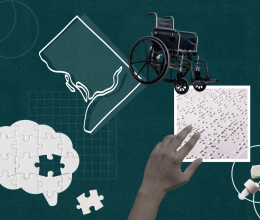The D.C. Department of Public Works (DPW) has forced Doretha Barber to choose between her medication and her job. This case raises a simple question: Does the fact that Ms. Barber’s medicine is medical marijuana make it acceptable for her employer to impose that choice?
Ms. Barber—a mother of four, a life-long D.C. resident, and, for the past ten years, a DPW employee—suffers from debilitating back spasms. Her spasms prevent her from walking, standing, or lifting. Her condition also causes her to experience migraines so excruciating that they often bring her to tears.
When traditional treatments proved inadequate, Ms. Barber’s doctor suggested that she try using medical marijuana.
Enrolled in the District’s medical marijuana program, Ms. Barber secured the right under District law to obtain and use the medication that her doctor proposed. She found that medical marijuana significantly improved her condition, making her spasms less frequent and less painful.
Like countless of medical marijuana patients throughout the country, Ms. Barber uses her medication responsibly. She has never come to work impaired or used medical marijuana on her employer’s property. She simply wanted to be able to use medical marijuana at home and continue working as a sanitation worker—a position that involves raking leaves and trash from the city’s streets, but does not require her to operate machinery.
In summer 2019, DPW placed Ms. Barber on forced leave without pay and informed her that she could not return to work until she stopped using medical marijuana, even though she used it only during her off-duty hours. After advocacy by the ACLU-DC and Ms. Barber, DPW assigned Ms. Barber to a new position and allowed her to use medical marijuana after work. DPW did not, however, compensate her for the extended time she spent on unpaid leave, time that forced her to run up debt with family and friends, default on car payments, and ultimately lose possession of her car. Nor did it compensate her for the significant pain she endured during months she spent refraining from using medical marijuana in the hopes of passing a urinalysis test and returning to her original position.
The District of Columbia Human Rights Act requires employers to address the needs of people with disabilities based on facts, not stereotypes. Here, the facts are simple: Ms. Barber could perform her job duties as long as she was allowed to use medical marijuana in her own time. She should not have been punished for using medicine crucial to her health and filed this lawsuit to vindicate her right to equitable treatment.
October 2023 Update: After advocacy by the ACLU-DC, the District agreed to settle this lawsuit and compensate Ms. Barber for her injuries.


